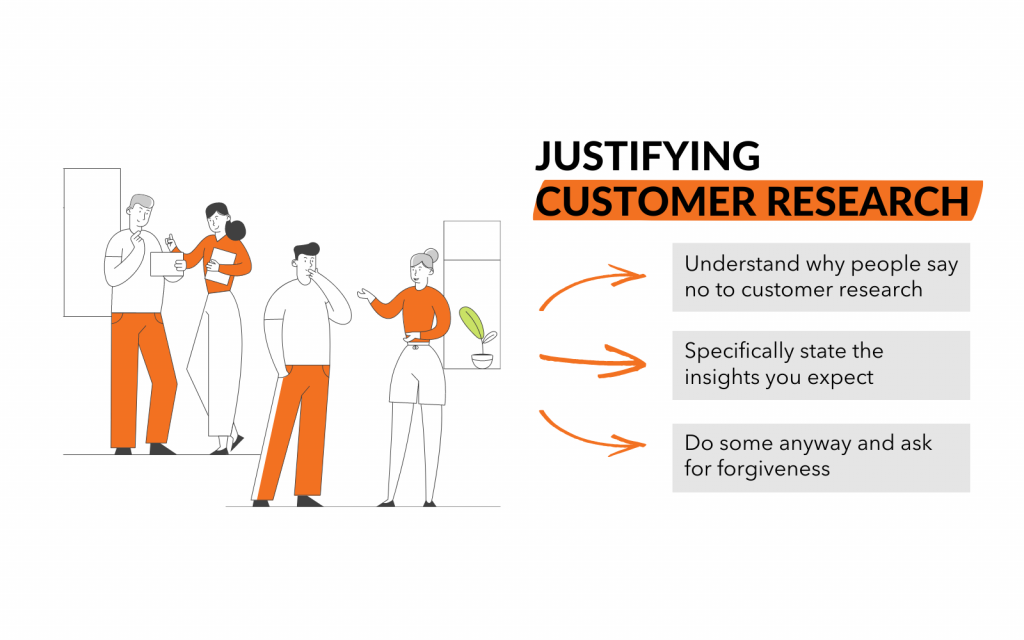
One of the biggest hurdles to doing customer research is convincing your stakeholders to say yes to it. You know you have knowledge gaps you have, and you know that talking to customers will yield insights, but your stakeholders can’t see the value. So, how do you justify doing customer research?
Over the years, I’ve developed some techniques for justifying customer research that usually result in changing someone’s response from “no, we don’t need to interview customers, we know what we need” to “yes, it would be great to understand that and I know we need to”.
The techniques I’ll cover in this post are specifically for justifying customer research like interviews and surveys – talking to customers – because this is the component of Product Discovery that people push back on the most.
The techniques are:
- Understand why people say no to customer research
- Specifically state the insights you expect
- Do some anyway and ask for forgiveness
#1 Understand why people say no to customer research
First, though, you need to understand why a stakeholder – maybe your manager – is pushing back on doing customer research. They will likely give you a reason for not doing customer research that sounds like one of these:
- “We’ve done research in the past. Just use that”
- “We know our customers and know what they want”
- “We don’t have time for that”
- “We don’t have the budget for that”
Ultimately, these are all signs that they don’t see the value in doing customer research.
In the past, I would only try to address each of these symptoms directly. I’d explain why thinking “we understand our customers” is dangerous. I’d talk broadly about the benefits of product research (“we might reduce the cost of building something we don’t need” or “what if we find a way to make it more valuable”). This sometimes works and is necessary to set the right foundations, but it didn’t always get it over the line and would sometimes lead to a frustrated product team and a frustrated stakeholder.
You need to have some empathy here. If you haven’t seen good research taken through to good execution, then you can’t see the value that it brings. “I’m going to interview some people” sounds much less productive than “I’m going to write some code”.
#2 Specifically state the insights you expect
What I’ve learnt is that you need to choose your words carefully. You need to focus on specifically stating the insights that you expect to come from customer interviews, that you need to make your product a success.
Instead of “we don’t understand what customers want” say things like:
- We don’t understand which customer segment is going to respond best to this new product/feature.
- We don’t know how customer persona X actually does Y Job-to-be-Done.
- We want to make sure the way we design for feature Y is going to meet customer persona X’s needs.
- We don’t know enough about Z aspect of customer persona X, and Z aspect could really change how we go-to-market with product Y.
Avoid general statements and replace them with specifics to the task at hand.
#3 Do some anyway and ask for forgiveness
If all else fails, you need to go and do some customer research without asking permission. You likely won’t need to ask for forgiveness because if you do it in the right way, your stakeholders will be happy.
The right way is to just go and do a small amount – like 4 or 5 interviews – and then present back what you’ve found. You won’t be punished because you’re just doing your job and you haven’t spent much time at all.
In every single case where there has been push back, once we’ve done a little research anyway stakeholders have come around. Showing someone the insights is sometimes easier than telling them about it.
Videos about customer interviews:

Scott Middleton
CEO & Founder
Scott has been involved in the launch and growth of 61+ products and has published over 120 articles and videos that have been viewed over 120,000 times. Terem’s product development and strategy arm, builds and takes clients tech products to market, while the joint venture arm focuses on building tech spinouts in partnership with market leaders.
Twitter: @scottmiddleton
LinkedIn: linkedin.com/in/scottmiddleton